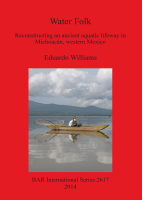Description
BOOK DESCRIPTIONThis study of subsistence activities (fishing, hunting, gathering, and manufacture) in the Cuitzeo and Pátzcuaro lake basins (Michoacán, Western Mexico) underscores the value of ethnoarchaeology as a tool for reconstructing the ancient aquatic lifeway inthe territory of the Protohistoric Tarascan state (ca. AD 1450-1530), which flourished in an environment dominated by lakes, rivers, swamps and marshes. Mesoamerica was the only civilization in the ancient world that lacked major domesticated sources of animal protein; therefore, abundant wild aquatic species (fish, birds, reptiles, amphibians, insects and plants, etc.) all played strategic roles in the diet and economy of most Mesoamerican cultures, including the Tarascans.











